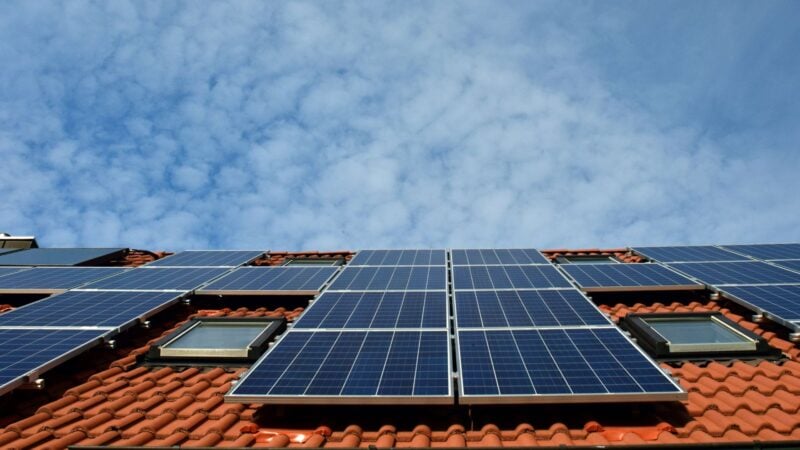How Solar Panels Can Increase the Value of Your Home – The Good Men Project

—
The Financial Benefits of Installing Solar Panels
Experts at Sun Valley Solar Solutions emphasize that investing in solar panels can immediately lead to significant financial savings and long-term savings. You can see a noticeable decrease in your monthly utility bills by reducing your reliance on traditional electricity sources. For instance, a typical household can save an average of $1,200 annually on electricity costs. Larger homes might save even more, with potential annual savings reaching up to $2,500. These savings can accumulate over time, making solar panels a financially savvy choice.
Beyond the savings on electricity bills, various tax incentives and rebates are available for those who install solar panels. Many states offer tax credits that can cover a significant portion of the installation costs. For example, the federal solar tax credit allows homeowners to deduct 26% of the cost of installing a solar energy system from their federal taxes. Additionally, some states and local governments provide rebates that can further reduce the initial investment.
Moreover, installing solar panels can increase your home’s resale value. Recent studies have shown that homes with solar energy systems sell for approximately 4.1% more than comparable homes without solar panels. This means that a home valued at $300,000 could see an increase of around $12,300 in its resale price. This added value, combined with the ongoing savings on electricity bills and available tax incentives, makes solar panels a compelling investment for homeowners.
Environmental Impact and Energy Independence
When you install solar panels on your home, you’re saving money on your electricity bill and making a significant contribution to the environment. Solar panels help in reducing carbon footprints by generating clean, renewable energy. This means fewer greenhouse gases are released into the atmosphere, which is crucial for combating climate change. For instance, a typical residential solar panel system can reduce CO2 emissions by approximately 3 to 4 tons annually. That’s like planting over 100 trees each year!
Another significant advantage of solar panels is the energy independence they offer. By generating electricity, you become less reliant on the grid and more resilient to power outages and price hikes. This is especially beneficial in areas prone to natural disasters or where the power grid is less reliable. Imagine not worrying about your electricity bill skyrocketing during peak usage or being left in the dark during a storm. Solar panels give you a reliable and sustainable energy source at your fingertips.
Moreover, numerous environmental initiatives, both locally and globally, support the adoption of solar energy. Governments and organizations offer incentives, tax breaks, and rebates to encourage homeowners to go solar. These initiatives make solar panels more affordable and amplify their positive environmental impact. By choosing solar, you align yourself with a global movement towards a more sustainable and eco-friendly future.
Market Demand and Buyer Preferences
There’s a growing market demand for eco-friendly homes, and it’s not just a passing trend. Homebuyers increasingly seek properties that offer comfort and contribute to a sustainable lifestyle. Solar panels are a significant part of this equation, making homes more attractive to potential buyers. According to a recent survey, many buyers are willing to pay a premium for homes equipped with solar energy systems. This isn’t just about saving on energy bills but investing in a greener future.
Real estate agents are also noticing this shift. Many have reported that homes with solar panels sell faster and at higher prices than those without.
Cost vs. Value: Analyzing the Investment
When evaluating the initial installation costs of solar panel systems, weighing these expenses against the long-term value increase they bring to your home is crucial. While the upfront costs can be significant, the return on investment (ROI) often justifies the expenditure. For instance, a standard 5kW solar panel system might cost around $15,000, but with tax incentives and energy savings, homeowners can see a substantial increase in their property’s value.
Financing options also significantly contribute to making solar panels more accessible. Homeowners can explore solar loans, leases, and power purchase agreements (PPAs) to spread out the costs over time. Experts advise that understanding these options can help you make an informed decision that aligns with your financial situation. Many homeowners have successfully recouped their investment through energy savings and increased property value, making solar panels a wise financial choice in the long run.
Maintenance and Longevity of Solar Panels
One of the most appealing aspects of modern solar panels is their low maintenance requirements. Unlike other home improvement projects, solar panels demand minimal upkeep. All you need to do is ensure they are clean and debris-free. This can be as simple as rinsing them with a garden hose a few times a year. These straightforward steps can maintain the efficiency of your solar panels, ensuring they continue to generate optimal energy output.
When it comes to the lifespan of solar panels, you can expect them to last between 25 to 30 years. Most manufacturers offer warranties that cover performance and product defects for up to 25 years, giving you peace of mind. These warranties often guarantee that the panels will still produce a significant percentage of their original output after two decades. This longevity means that once you install solar panels, you can enjoy the benefits for many years without worrying about frequent replacements.
To keep your solar panels operating at peak efficiency, consider these maintenance tips:
- Regularly inspect for dirt, leaves, and other debris that might block sunlight.
- Check for any shading from new plant growth or nearby structures.
- Monitor the system’s performance through the provided app or monitoring service.
Regarding costs, maintenance expenses for solar panels are relatively low compared to the savings they generate.
—
This content is brought to you by sunvalleysolar.com
Photo provided by sunvalleysolar.com


